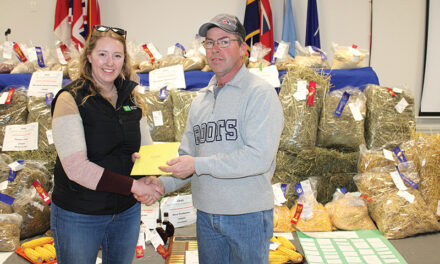The face of poverty in Ontario is changing and rural communities have their own unique challenges. Representatives from local food banks and Feed Ontario gathered recently to share information from their 2022 report and to try and bring the information they have gathered to the public. Present were from left: Ashley Quan, Feed Ontario, Cathy Ashby, House of Lazarus and Food Banks United, Bonnie Pidgeon Cougler, executive director of South Grenville Food Bank, Jane Schoones, Dundas & Stormont Community Food Share Lead, Lisa Duprau, Agape Centre, Cornwall and Joanne Mcintyre, Rideau Community Health Service. Tinkess Photo
MORRISBURG – A presentation at the Morrisburg Arena by Feed Ontario and Food Banks United focused on how the face of poverty is changing and how small rural communities have their own unique problems in trying to help people in need.
Ashley Quan of Feed Ontario presented information contained in the organizations’ 2022 report which is titled “Hunger Report 2022: The Deepening Cracks in Ontario’s Economic Foundation”.
The report, released in November 2022 is based on input from the one hundred and forty direct member foodbanks and approximately 1,100 affiliated agencies that are part of Feed Ontario.
“It’s easy to just look at rising food prices and say “Oh, that’s the culprit,” said Quan, “but as food banks know, people are less resilient than they were before. They can’t weather these temporary economic storms, like a temporary job loss or rising food prices like they could previously. Food banks are for many people, an option of last resort after they’ve burned through other supports; savings, relying on family and friends, that sort of thing.”
There are several trends creating this situation. “Over the last 30-40 years employment in Ontario has moved away from those full-time jobs with benefits that are secure, into much more precarious, low paying work,” said Quan. “There’s a big shift in “gig work”, things like Uber or DoorDash, that sort of thing. In Canada, nearly one in ten people engage in that sort of work now.”
The result is that employment is less of a protection against poverty than in the past. There was a 47 per cent increase in the number of people with employment visiting food banks. “Even if people do have jobs, they are not protected against poverty the way that they were in the past,” said Quan.
Because there are so many people engaged in precarious employment, they also don’t have access to the same protection that an employee would. “When people lose jobs, supports like employment insurance that people rely on are less accessible than they used to be,” said Quan. “Most people used to be able to turn to EI while they looked for another job, but in the year before the pandemic, less than a third of unemployed Ontarians were actually able to access EI, due to changes in the program and changes in how the job market works.”
Affordable housing is also an issue across Ontario, but it has become a serious problem because of the pandemic. When people were able to work from home, many chose to move out of large urban centres to smaller communities where housing costs were lower. This in turn tightened the housing market even more, in some cases pushing people out of the market all together. Surprisingly, the largest rent increases since 2019 were outside the GTA.
According to Quan, a solution to this would be social housing or geared to income housing, but unfortunately social housing builds have not kept up with population growth in Ontario.” In the early 80s the new units relative to population growth were at seven per cent and now it is barely even on the chart,” says Quan. “This means we have been falling further and further behind.”
Feed Ontario has several recommendations for change, such as an increase in what is called “quality employment”, said Quan. “One of the recommendations that we had was to look at gig work, which is a significant part of the economy now,” he said. “Gig workers are actually not protected by the Employment Standards Act,” said Quan. “They don’t contribute to employment insurance or CPP, so they are not entitled to those benefits. Making those policy changes to protect them like any other employee would help them weather the storms a little bit better.”
People in need in rural Ontario also face the additional hurdle of lack of public transportation. Jane Schoones is the team lead for Community Food Share, which serves clients in Dundas and Stormont counties. “The issue is that if you absolutely can’t afford to rent, you have to find another place to live, and maybe you can’t afford a vehicle,” said Schoones. “We have a lot of people in Dundas and Stormont who don’t have vehicles.” As a result, they must rely on a friend or family member to drive them, which certainly isn’t a long-term solution.
It is because there is such a pressing need and because they have so many things in common, several foodbanks joined together under the Food Banks United banner. Cathy Ashby is the executive director of House of Lazarus and chair of Food Banks United. The group was formed in 2018. “A few of us realized that we had more strength when we worked together instead of all of us trying to solve all of our communities’ problems on our own,” says Ashby. Their goal is to ensure that their clients have access to the same level of service as people in larger communities. “Our mission is working together to address poverty and make real change in our communities.”
The Feed Ontario 2022 report
can be found at https://feedontario.ca/research/hunger-report-2021/.

Terry Tinkess is a professional photographer, educator and journalist. He has been making a living with a camera and keyboard since 1999 and has been featured in such publications as The Ottawa Citizen, Cornwall Standard Freeholder, The Globe and Mail, The Miami Herald, Ottawa Construction News, The Ontario Construction Report, Ontario Home Builder Magazine, Reed Construction Data, Canadian Potato Business and most recently, The Record and Eastern Ontario AgriNews. Terry lives in Ingleside, Ontario with his wife Brenda, Mia the anxious Pittie and cats Wally and Chubbers.











